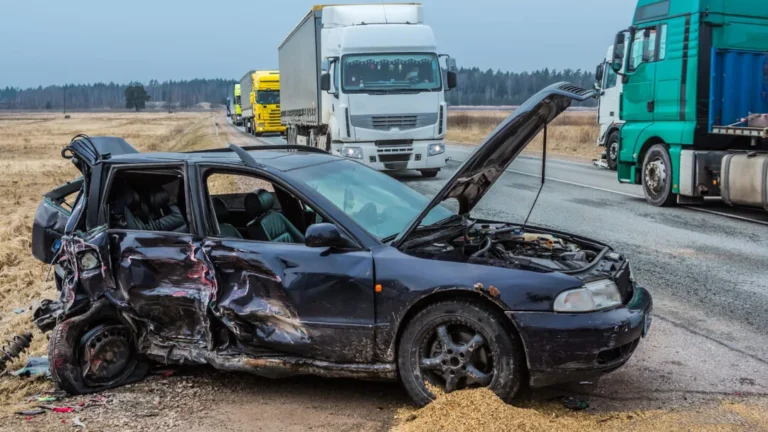
Navigating the aftermath of an auto accident is always challenging, but the stakes are significantly higher when a commercial vehicle is involved. In California, a state with bustling highways and extensive commercial transport, understanding the specific protocols and legal nuances is crucial for anyone involved in such an incident. Whether it’s a delivery truck, a company car, or a massive eighteen-wheeler, accidents with commercial vehicles demand a thorough and informed approach to ensure proper handling of claims, liability, and potential legal actions.
After such a mishap, taking legal recourse is par for the course. However, before you shell out the big bucks, look for law firms that offer free case evaluation. This helps you get an idea of the steps to take when moving forward. Dealing with the aftermath of such accidents requires knowledge and understanding of specific procedures and considerations. In this guest post, we will provide valuable tips on how to handle auto accidents involving commercial vehicles.
Understanding the Unique Challenges
When an accident involves a commercial vehicle, there are certain unique challenges that come into play. Commercial vehicles are typically larger and heavier than regular cars, which can lead to more severe accidents and injuries. Additionally, determining fault in these situations can be more complex due to multiple parties potentially being involved, including the driver, trucking company, and even vehicle manufacturers.
Immediate Actions: Ensuring Safety
In any auto accident scenario, prioritizing safety should be the first step for everyone involved. If you are at the scene of an accident involving a commercial vehicle:
- Ensure your own safety by moving to a safe area away from traffic.
- Check the well-being of others involved and call emergency services if necessary.
- Turn on hazard lights and set up warning signs or flares if possible.
- Exchange contact and insurance information with other parties involved.
Gathering Evidence
When it is safe to do so, obtain evidence from the accident scene. This step can significantly impact potential insurance claims or legal proceedings if necessary. Here’s what you should try to gather:
- Take photos: Capture images of both vehicles involved from different angles, including points of impact and any damages caused. Also photograph road damage and debris on the ground for a traffic accident scene reconstruction later on.
- Record eyewitness accounts: Speak with witnesses present at the scene who may have seen what happened or have relevant information regarding the accident.
- Note environmental factors: Make a note of weather conditions or other environmental factors that may have contributed to the accident.
Reporting the Accident
Depending on local regulations, auto accidents involving commercial vehicles may require additional reporting beyond just exchanging information at the scene.
- Contact law enforcement authorities: Inform them about the accident, especially if there are road closures or serious injuries involved.
- Report to your insurance company: Notify your insurance provider about the accident promptly and provide them with all the information you collected, as well as any police reports.
- Consult an attorney: If the accident resulted in significant damage, injury, or a complicated legal situation involving multiple parties, it is advisable to speak with an attorney specializing in auto accidents involving commercial vehicles.
Navigating Insurance Claims
Dealing with insurance companies can be challenging after an auto accident involving a commercial vehicle. Keep the following tips in mind when navigating insurance claims:
- Report the accident promptly: Notify your insurance company as soon as possible to expedite the claims process. Stick to the deadline provided in the statute of limitations.
- Document all expenses: Keep track of medical bills, vehicle repair costs, and any other expenses related to the accident for accurate reimbursement or compensation.
- Review your policy: Familiarize yourself with your own insurance policy coverage as well as any applicable policies held by the commercial vehicle driver or their employer.
Legal Actions
In certain instances, you may need to resort to legal action to protect your rights and secure appropriate compensation for damages or injuries sustained. Consider these factors when deciding whether or not consulting with an attorney is necessary:
- Assessing liability: An attorney can help determine who is at fault for the accident and how much responsibility each party holds.
- Gathering evidence and experts: Attorneys have experience gathering evidence, interviewing witnesses, and consulting experts who can support your case.
- Negotiating settlements or representing you in court: If negotiations fail with insurance companies or other liable parties, having legal representation improves your chances of achieving a fair settlement through mediation or taking your case to court if necessary.
In Summary
Due to their unique challenges and potentially severe outcomes, auto accidents involving commercial vehicles require careful handling. By ensuring immediate safety measures are taken, gathering evidence effectively, reporting the accident properly, navigating insurance claims, and possibly seeking legal assistance, you can protect your rights and secure the compensation you deserve. Being informed and proactive in such situations is essential to effectively handle the aftermath of auto accidents involving commercial vehicles.


